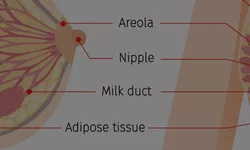This article is part of a series on using breastfeeding as birth control.
Does breastfeeding prevent ovulation?
Q: I heard that breastfeeding prevents ovulation, is that true?
A: Ovulation requires the release of three hormones in the female body: follicle-stimulating hormone (FSH), luteinizing hormone (LH) and Estrogen hormone (ES).
Breastfeeding, on the other hand, depends on prolactin hormone. The release of prolactin hormone limits the brain's ability to release FSH, LH and ES. So, yes, breastfeeding plays a role in preventing ovulation.
This is very clear when one looks at the data. Women who do not breastfeed at all can ovulate again as early as 3 weeks after birth (average time is 40 to 50 days). Women who breastfeed will considerably delay their first ovulation with an average time rising to anywhere between 3 months and 8 months after birth.
This means that while breastfeeding can considerably delay and hamper ovulation it doesn't prevent it per se. Thousands of women every year get pregnant while breastfeeding.
To have some form of guarantee that you will not ovulate while breastfeeding, you should follow the LAM method. As explained in our article about using breastfeeding as birth control, this method virtual guarantees that ovulation not happen before at least 6 months after birth.
One of the main requirements of the LAM method is that you exclusively breastfeed your baby. Some mothers wrongly think that they can just breastfeed occasionally and be protected during the first 6 months. This is not true. Your baby should eat no other solid or liquid than your breast milk.
This is, by the way, not only necessary for the birth control purposes but also the best thing you can do for the health of your baby. All medical professionals recommend exclusive breastfeeding until 6 months old. It is for instance what the US Center for Disease Control and Prevention (CDC) officially recommends on their website.
Producing a high enough volume of milk to exclusively breastfeed their baby might be difficult for some women.
We find Milk Boost Tea to be a considerable help if that's your case. It's a 100% natural herbal tea designed to help you boost your milk volume as well as the quality of your breast milk.

Milk Boost Tea may help you with your milk supply
Among its ingredients is Dong Quai, a root also known as the "female ginseng" for its wide range of health benefits for women. It also contains Sponge gourds (Loofah), famous for their ability to facilitate lactation.
You might also be interested by the other articles in our series about using breastfeeding as birth control:
- Does breastfeeding stop you getting pregnant?
- Can I be fertile if I breastfeed and I don't have periods?
- When will I be fertile again if I breastfeed?
- How do I make LAM work?
- How can I get pregnant while breastfeeding?
- The benefits of breastfeeding as birth control
- Does breastfeeding prevent periods?
Article tags: Breastfeeding and maternity








